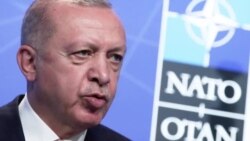On October 23, Turkish President Recep Tayyip Erdogan lashed out at ambassadors of 10 countries for urging Turkey to release Osman Kavala, a philanthropist whom the Turkish authorities accused of sponsoring opposition protests in 2013 and 2016 and of espionage.
Kavala has spent four years in detention without a conviction. The European Court of Human Rights called for his release two years ago and said Kavala’s imprisonment was meant to silence him.
Speaking before the crowd in the northwestern city of Eskişehir, Erdogan said he ordered the foreign ministry to declare the diplomats “persona non grata” and expel them.
The reason? Erdogan declared that they “cannot dare to come to the Turkish foreign ministry and give orders.”
That is misleading.
Rather than issue orders, the countries all had signed a letter calling for Kavala’s freedom. They include NATO members Canada, Denmark, France, Germany, the Netherlands, Norway, and the United States, along with non-members Finland, New Zealand and Sweden.
Erdogan later backed off his expulsion threat, as explained below.
The Kavala letter was issued October 18, the fourth anniversary of his detention.
The letter says a “just and speedy resolution to (Kavala’s) case must be in line with Turkey’s international obligations and domestic laws. Noting the rulings of the European Court of Human Rights on the matter, we call for Turkey to secure his urgent release.”
In 2019, the EU court determined that Kavala's detention was political. Turkey, which is not a member of the European Union, refused to release him. Instead, in December 2020 Turkey’s Constitutional court upheld Kavala’s continued detention.
Kavala was initially acquitted by a Turkish court, but he was recharged and kept in detention.
In September, the Council of Europe issued a threat to begin infringement procedures against Turkey if Kavala is not freed by November.
Though not in the EU, Turkey is a member of the Council of Europe, a separate body that enforces minimum legal standards among its 47 members. Under infringement, Turkey could lose its membership or voting rights or be suspended from the council, Reuters reported.
Erdogan said in his Saturday speech that foreign diplomats “should either understand Turkey or they should leave. It is not a tribal state as you might consider. This is Turkey.”
Turkish foreign ministry summoned the diplomats on October 19, and accused them of “meddling in the Turkish judiciary.” But the move threatened a major diplomatic rift ahead of this weekend’s G-20 economic conference in Rome. That may have stymied the expulsions, Reuters reported.
On Monday, October 25, Erdogan retracted his threat, proclaiming that the diplomats "have taken a step back from the slander against our country," and "will be more careful now."
Before his arrest in 2017, Kavala served on the Open Society Foundation's advisory board in Turkey. The foundation’s Turkish branch closed in 2018.
Since the 1990s Kavala, an heir to a family tobacco business, sponsored various civil society projects in Turkey, including cultural and heritage preservation programs. Turkish authorities accused him of “attempting to overthrow the constitutional order through force and violence” by allegedly financing the anti-Erdogan protests in 2013 and 2016.
In February 2020, a court in Istanbul acquitted him and ordered his release. But he was rearrested few hours later with the new charges, including espionage.
Hundreds of thousands have been imprisoned or purged from state jobs in Turkey since Erdogan survived a coup attempt in 2016. His Islamist government has also cracked down on critical journalists, often jailing them or taking them to court for “insulting” the president.
Kavala has said he will no longer attend his trial, Reuters reported. The next hearing is scheduled for November 26.






